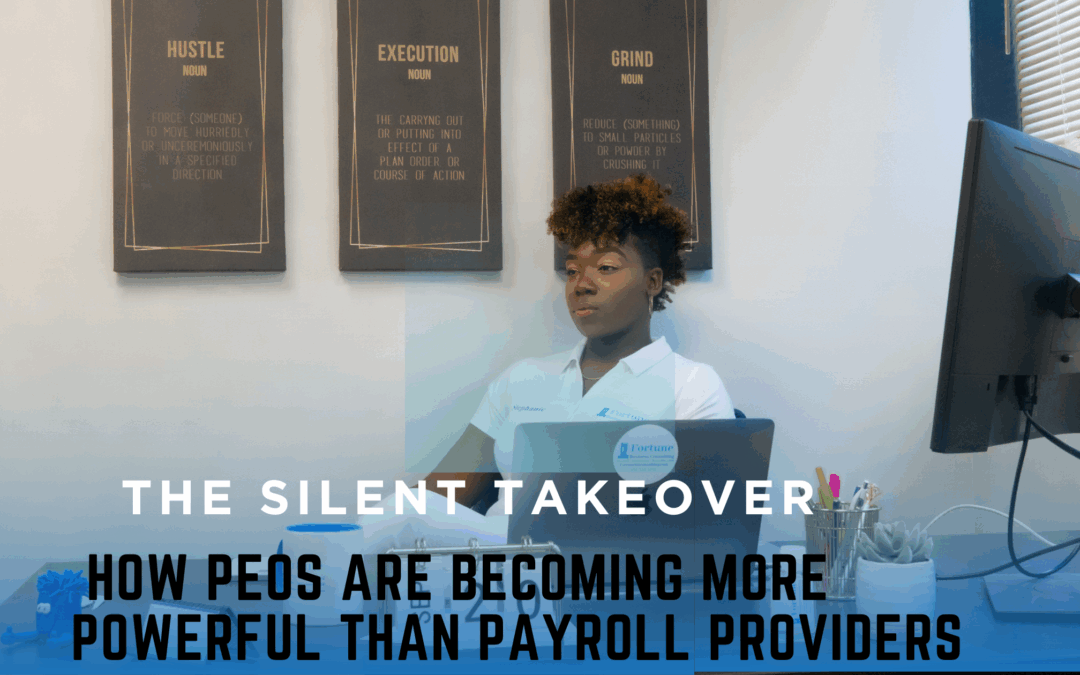The payroll industry used to be the quiet engine of business operation cutting checks, filing taxes, staying in the background. Then came PEOs, strutting in like they owned the place, offering not just payroll but HR, compliance, benefits, and in some cases, strategic control over how companies run. The silent takeover is happening right under everyone’s noses. The question isn’t whether payroll providers are losing ground; it’s whether PEOs are rewriting the rulebook entirely.
1. Payroll Was About Math—PEOs Made It About Power
Payroll companies were calculators with logos. They handled numbers, deducted taxes, and stayed invisible. But PEOs turned payroll into an access point for influence. Suddenly, the people who process your employees’ paychecks are also advising on compliance, managing your HR policies, and negotiating your benefits packages. That’s not “outsourcing” anymore- it’s embedding themselves at the core of your company’s DNA. Example: A startup that signs with a PEO isn’t just handing over payroll; they’re handing over a slice of authority.
2. Benefits Negotiation: The Trojan Horse
Payroll providers never got invited to the boardroom. They dropped off reports and left. PEOs, on the other hand, waltzed in with cheaper healthcare, pooled retirement benefits, and irresistible compliance guarantees. What founder says no to that? It’s the Trojan Horse of modern business-the perk that gets them in the door, while behind it comes HR policy control, hiring structures, and even employee surveillance (yes, we said it). Suddenly, they’re not just a vendor; they’re a gatekeeper.
3. Data Is the New Payroll—and PEOs Have It All
Payroll providers see numbers. PEOs see everything. Attendance records, performance data, healthcare utilization, onboarding speed, even employee grievances. That’s not payroll- that’s the holy grail of workforce intelligence. Imagine a provider who not only knows when your employees clock in, but also how likely they are to quit in six months. Who do you think has more leverage- the company or the PEO? Exactly.
4. The Quiet Brand Shift: From Vendor to Partner
Payroll companies are “service providers.” PEOs are “partners.” Sounds harmless, right? Except “partner” really means they have influence over critical business decisions. It’s a branding trick that gives them permission to sit in meetings payroll providers were never invited to. Think about it: when was the last time anyone asked ADP Payroll to weigh in on culture strategy? With PEOs, it happens all the time. And that shift in perception is what’s fueling the takeover- quietly, without anyone labeling it what it truly is: a redistribution of power.
5. The Future: Payroll Providers Playing Catch-Up
Payroll companies are scrambling to bolt on “HR solutions” and “compliance dashboards” just to keep up. It’s like watching Blockbuster launch streaming in 2010- too little, too late. PEOs aren’t just winning the payroll war; they’re redefining the battlefield. And unless traditional payroll giants reinvent themselves fast, they’ll become the next cautionary tale. The scary part? Most founders don’t even realize the takeover is happening, because PEOs make it feel like “support.”
Conclusion
The rise of PEOs isn’t just disrupting payroll- it’s redefining the employer-service provider relationship altogether. Payroll providers used to be number crunchers. Now, PEOs are strategic powerhouses, shaping decisions that ripple across compliance, culture, and even investor perception. Call it what you want—innovation, evolution, or corporate colonization—but the silent takeover is already here.
References

